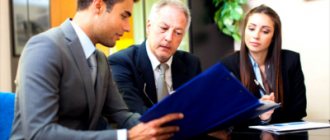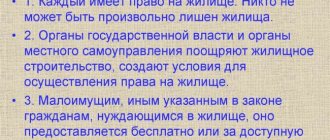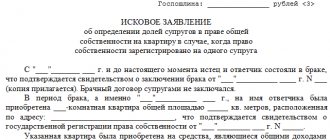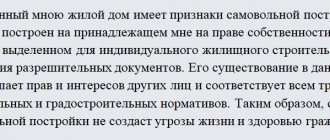General reasons for occurrence - characteristics
All grounds for the emergence of property rights can be divided into two large categories - initial and derivative.
The initial ones include:
- Creation of any thing , that is, obtaining a new product as a result of processing raw materials.
- Appropriation of any publicly available items . An example is the collection of wild berries and mushrooms in public forests.
- Receiving income from existing property . This could be crops from land or income from the use of real estate. In any case, all such benefits from the moment of creation belong to the owner of the property from whom they were received.
- Acquisition of property lost by the owner or intentionally abandoned by him . The law provides for a set of certain actions through which a person can acquire ownership of a find.
- Acquisitive prescription . This concept means that a person owned a certain thing openly to others and conscientiously took care of it for a certain time. The acquisition limitation period for real estate is set at 15 years, and for other property - 5 years (Article 234 of the Civil Code of the Russian Federation).
Good faith ownership of property is determined quite simply. The person must perform all the usual duties for the owner: maintain the thing in working order, take care of it, carry out routine repairs.
If it comes to real estate, the owner must also make regular payments for the use of land or other natural resources. If we analyze the acquisition of real estate by acquisitive prescription, then such a situation arises extremely rarely.
On the video grounds for the occurrence of changes and termination of ownership:
Government bodies have every opportunity to control residential and non-residential premises throughout the country. In addition, it will be very difficult to clearly establish the beginning of the 15-year period that precedes the acquisition of property rights on this basis.
Secondary grounds for acquiring property rights include:
- Acquisition of property. The most common way. Any item can be bought, exchanged, received as a gift, received under a contract for the processing of raw materials supplied by customer, and so on.
- Transfer of property by inheritance.
- When a legal entity is reorganized, its property is transferred to another organization by decision of the general meeting of participants.
- Some authors, for example, Pulyaevskaya L.V., highlight privatization as the basis for acquiring property rights. Despite the fact that this institution has very specific features, the very transfer of a specific item, be it an apartment or an industrial enterprise, is formalized by an appropriate agreement. And this document has all the necessary civil legal attributes. Thus, privatization seems to be only a special case of alienation of state property to a private person.
- Article 218 of the Civil Code of the Russian Federation provides for the acquisition of ownership rights by members of the cooperative after payment of all share contributions. Housing cooperatives are well known to everyone. After completion of the construction of a multi-apartment residential building, it is on this basis that the right of ownership to individual residential premises arises.
As an example of a special basis for the emergence of state property, nationalization should be mentioned. It should be distinguished from the usual acquisition of property by municipal and federal entities, which are carried out on the basis of contracts.
After reading this article, it will become clear how to register an apartment as an inheritance.
You can understand how ownership of an apartment in a new building that is under mortgage occurs by reading this article.
What the specification of property rights in biotechnology means, you can find out from this article here: https://ruleconsult.ru/grazhdanskoe/sobstvennost/specifikaciya-prav-sobstvennosti-oznachaet.html
Nationalization is a forced process of transferring lands, enterprises, banks and other property to the state with or without payment of appropriate compensation.
List of derivatives
Derivative methods for the emergence of property rights are varied; they can be listed for a very long time. Nevertheless, almost every modern citizen knows about them. In particular, the owner of the property.
The following operations can be included in this category:
- purchase of real estate and other objects;
- donation;
- inheritance;
- exchange;
- ransom;
- mortgage;
- privatization.
What happens under certain circumstances? What features do the listed operations provide?
Termination of such right
Termination of ownership may be associated with many legal facts. Their entire set can be divided into the grounds for voluntary termination of the right in question and forcible alienation of property.
We list the reasons on a voluntary basis:
- Alienation of property . Transfer of property means a two-way process. Once one person acquires property rights, another person loses it.
- Refusal of a thing . The owner publicly declares that he no longer wishes to own any item, or takes certain actions indicating such intention. For example, a person throws out his property at a waste disposal site. It does not matter whether the item has lost its consumer properties. However, the right of ownership is completely terminated only when another person takes possession of the discarded property. For example, a waste recycling organization accepted discarded items for recycling. If such an organization does not accept waste for processing due to its environmental hazard, then ownership will not cease.
- Consuming things . A man bought soap for himself, used it completely and lost his right of ownership because the object of this right ceased to exist. A separate category is the destruction or destruction of a thing. Such a process can occur against the will of the owner, therefore this basis cannot be classified as voluntary.
It is also necessary to know and understand that there is a law on the protection of property rights.
On video grounds the forced termination of ownership:
Compulsory grounds for termination of property rights are listed in Part 2 of Article 235 of the Civil Code of the Russian Federation:
- Foreclosure of property . The owner is a debtor, did not fulfill his obligation on time, and the creditor turned to court for protection. By decision of this body, the plaintiff’s demands are satisfied through the imposition of a penalty on the property of the losing party.
- Forced redemption of property that cannot belong to a person . That is, things that are limited in circulation. This could be a service weapon, cultural property, and so on.
- Alienation of real estate in connection with the seizure of a land plot or termination of a lease agreement for it . For example, government agencies require land to lay a gas pipeline. It is not possible to move a house located on a site to another location in an economically feasible way. Therefore, the state buys it from the owner for a fair price.
- Confiscation of property is deprivation of benefits as a primary or additional punishment for an offense.
- Requisition is the seizure of property to eliminate the consequences of accidents, man-made disasters and other emergencies. It is carried out by decision of government bodies with subsequent payment of fair compensation.
- Seizure of property for the benefit of the state in accordance with anti-corruption and anti-terrorism legislation. It is carried out if the person was unable to provide evidence of the legality of the acquisition of property.
It is also very important to know what applies to the initial methods of acquiring ownership.
The considered grounds for the emergence and termination of property rights are characteristic of both private and public forms.
Privatization can be called a specific basis for the termination of the right of state and municipal property. This institution involves the transfer of property specified by law into private ownership free of charge or at a reduced cost.
Russian legislation does not contain any special grounds for the forced termination of property rights. The list in Part 2 of Article 235 of the Civil Code of the Russian Federation is closed, therefore depriving persons of property for other reasons is illegal.
Some property objects have additional grounds for termination of ownership rights in relation to them.
Thus, the owner of a residential premises can be evicted with the loss of rights to the corresponding property complex if:
- The housing is recognized as unsafe and subject to demolition
- In accordance with the appropriate procedure, it was recognized as unfit for habitation
- The owner grossly violates the rules for using the premises. For example, the owner of an apartment unauthorizedly carried out redevelopment and refuses to eliminate its consequences. Based on the provisions of Article 29 of the RF Housing Code, such a citizen may be forced by the court to sell real estate. Such attention to how a person uses his property is associated with the protection of the rights of other homeowners in an apartment building. Redevelopment can cause significant damage to the entire building.
You may also be interested in learning about what to do if you have owned an apartment for less than 3 years and need to sell it.
What is a derivative method of acquiring property rights will help you understand the content of this article.
It will also be interesting to know what grounds exist for recognizing ownership of a land plot.
It is also important to know what is the procedure for registering ownership of real estate. All information is in this article.
Privatization
In Russia, people are quite actively privatizing housing. This is also a derivative way of the emergence of property rights. Only in this case they are transferred from the state to a private person.
Only citizens who are registered in housing and have either a warrant or a social tenancy agreement can hope for privatization. Third parties who are in no way connected with the apartment/house cannot exercise this right.
There is one free privatization available in the Russian Federation. After contacting the housing administration and reviewing a package of documents prepared in advance, a privatization agreement is concluded with citizens. This title paper will be useful in the future when registering property rights.
About registration
We have studied the derivative ways in which property rights arise. The original ones have not been forgotten either. It has already been said many times that after receiving the status of owner, you need to register your rights. This can be done at Rosreestr, at the MFC or at the cadastral chamber.
Typically, it takes about 5 days to issue documents on real estate ownership. The person is given an extract from the Unified State Register, which will serve as confirmation of the owner’s status.
Before registering with Rosreestr, can a citizen be considered the owner of an object? Yes. According to the law, this is so. But in reality, without state registration, it will be problematic to prove the mentioned fact. And it won’t be possible to perform legally significant transactions either.
Accordingly, without registration in the State Register, a person will be a full owner, whose rights are partially limited by realities.
Deeds of gift
A derivative method of the emergence of property rights includes donation. This form of transfer of property rights is becoming more and more common. Especially after marriage.
This is due to the fact that gifts are recognized as personal property, which leads to their indivisible status. In a divorce, donated objects are not divided. This is possible only in exceptional cases.
The gift agreement can be drawn up and executed by the current owner at any time. The main thing is that he is capable. The entire object or part of it is presented as a gift.
The agreement is executed by a notary. If a person decides to donate property acquired during marriage, then the consent of the spouse is required for the operation.
As you might guess, in such circumstances the document of title will be the gift agreement. It can be preliminary (providing for the transfer of rights to the object in the future) and regular. The donee is considered the owner of the property after signing the agreement.
Exchange and redemption
Derivative methods of acquiring rights to real estate include redemption and exchange. In the first case, something like purchasing the rights to the object is implied. They are bought from the owner.
During an exchange, as you might guess, the rights to property are replaced between all participants in the process. The corresponding agreements are signed by a notary, after which they can be used for state registration. Every adult citizen is able to participate in the processes. If children are involved in operations, their interests are represented by parents and guardianship authorities.
Inheritance
A derivative way of the emergence of state property rights are such operations as redemption and receipt of property by inheritance. More precisely, the transfer of property to the state in the absence of a testator or heirs. Or if they all give up the property.
However, most often this does not happen. And therefore, inheritance is considered as a derivative way of the emergence of property rights among the population.
You can enter into an inheritance by law and by will. In the first case, only relatives of the deceased citizen participate, in the second - any persons and organizations specified in the testamentary document.
Registration of the process involves a visit to a notary. An authorized person will issue a certificate of acceptance of the inheritance. With its help, after six months from the date of the death of the testator, it will be possible to issue a certificate of rights to property.
Documents for registration
What is useful for a person to register property rights under any circumstances? There aren't that many papers.
These include:
- identification;
- a receipt with the duty paid (not always);
- title documents;
- property papers, if any;
- birth certificates (for minors).
Derivative methods of the emergence of property rights (nationalization, privatization, and so on) are found everywhere.







